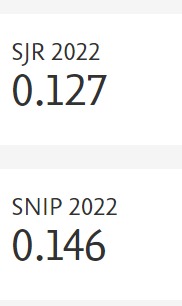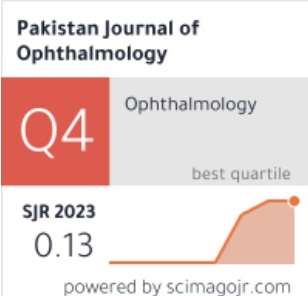Pain associated with Peribulbar Injection for Cataract surgery
DOI:
https://doi.org/10.36351/pjo.v25i2.641Abstract
Purpose: Patients planned/admitted for cataract surgery have a fear of worst pain due to peribulbar injection for anaesthesia rather than surgery itself. The principal objective and aim of this evidence based study is to find out the degree of pain associated with the anaesthetic peribulbar injection for cataract surgery.
Materials and Method: This prospective randomised study was carried out at Ophthalmology department CMH Sialkot from 12th Feb2008 to 22nd April 2008. 300 patients undergoing elective cataract surgery were administered a peribulbar block. Before injection all patients were briefed about the procedure and counselled regarding the degree of pain that they may experience. Patients were asked to grade the pain of peribulbar anaesthetic injection, using a Visual Analogue Scale (VAS).
Result: Focus of the study was on the degree of pain associated with anaesthetic peribulbar injection for cataract surgery. 300 patients (180 males and 120 females) were included in the study. 200 patients were having their first surgery, they were more apprehensive especially about the injection associated pain. 100 patients with history of previous cataract surgery (61 right eye and 39 left eye operated) were calm, confident and had low anxiety level.28 (9.2%) patients claimed that they felt no pain at all. 252 (84%) patients had just needle prick to feeling of heaviness/ mild pain. Only small percentage of patients i.e. 20 (6.66%) had injection associated moderate to severe pain.
Conclusion: The study revealed that the peribulbar anaesthesia for cataract surgery is safe and highly effective. The degree of pain associated with peribulbar injection is much less than what the patients actually have in their mind and fear of. The study also shows ‘pain threshold’ and anxiety level as major factors for pain perception.






